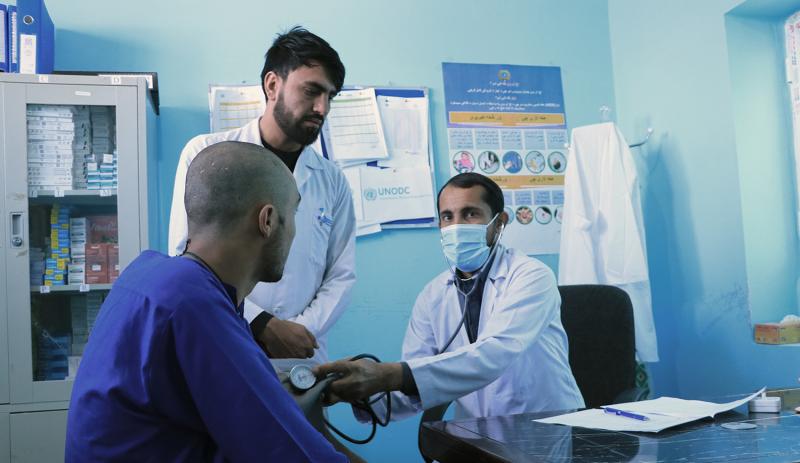

In Kandahar City, a family's struggle with addiction and poverty paints a vivid picture of the challenges faced by many in Afghanistan today.
Sherbano, a 25-year-old mother of two, found herself grappling with the harsh realities of life as her husband, Sardar, succumbed to the grip of drug addiction. For years, Sardar, a user of opium, heroin, and shisha, remained unemployed, which pushed the family deeper into hardship. Sherbano's brother tried to assist, but his help barely covered their basic human needs.
The situation remained unbearable until the day the outreach team from local NGO visited the family’s home. It was a critical moment, not just for the immediate medical care of her six-month-old daughter, suffering from severe diarrhea and vomiting, desperately needed, but also for the psychosocial support that would begin to mend this fractured family.
The local NGO, supported by UNODC as part of the Special Trust Fund for Afghanistan (STFA)’s Joint Regional Programme, focuses on establishing community-based support centers for individuals grappling with drug addiction. These centers offer a lifeline through various services, including medical care, HIV testing and counseling, and crucially, drug addiction treatment and rehabilitation services. The center in Kandahar is one of many aimed at tackling Afghanistan’s acute drug problem, which affects four million or close to 10 percent of population in Afghanistan.
In April 2023, the couple visited the drop-in center where Sardar started his transformative journey. Over the next three months, through consistent psychosocial counseling and participation in group sessions, he made remarkable strides in overcoming his addiction. The support didn't just end with treatment; it included comprehensive follow-up care and social reintegration services. Ultimately, he took a significant step forward by securing employment with a local vegetable shopkeeper, thus, beginning to contribute again to covering the household expenses.
The change in Sardar not only benefited him but also his family. Sherbano, once burdened by despair, saw new hope as her husband restored his health and social standing. The support received through the programme not only pulled Sardar back from the brink of destruction but also empowered Sherbano and their children to hope for a future free from the shadows of addiction.
This story is more than a personal victory for Sherbano’s family; it is a testament to the power of community-based interventions in restoring lives and strengthening the social fabric of communities ravaged by drug abuse and economic challenges. It highlights the essential role of targeted, compassionate, and comprehensive approaches in addressing the pervasive challenges of addiction—a critical step toward healing and rebuilding addiction ridden lives in Afghanistan.